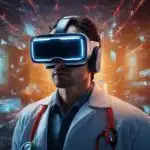The healthcare industry is at the forefront of a transformative era, driven by the rapid evolution of innovative technologies and collaborative partnerships. This article explores the evolution of medical research and the pivotal role of digital health, public health informatics, precision medicine, and interdisciplinary collaborations in shaping the future of healthcare. By leveraging data-driven insights, artificial intelligence, and cutting-edge advancements, the industry is poised to address pressing health challenges, reduce disparities, and unlock new frontiers in medical innovation for the betterment of tomorrow’s health.
As the healthcare landscape continues to evolve, the integration of digital health solutions, the power of public health informatics, and the personalized approach of precision medicine are redefining the way we deliver and experience care. The article delves into the ethical considerations, emerging trends, and the potential of health information technology to enhance patient care and improve population health outcomes. By embracing these advancements and fostering collaborative partnerships, the healthcare industry can drive forward-thinking solutions that address the complex health needs of individuals and communities.
Key Takeaways
- The healthcare industry is undergoing a transformative shift, driven by the rapid evolution of innovative technologies and collaborative partnerships.
- Digital health, public health informatics, and precision medicine are reshaping the delivery of healthcare, enabling more personalized, efficient, and effective care.
- Leveraging data-driven insights, artificial intelligence, and interdisciplinary approaches is crucial to addressing pressing health challenges, reducing disparities, and unlocking new frontiers in medical innovation.
- Ethical considerations, such as data privacy and security, as well as the need to address bias and promote inclusivity, are essential in the responsible implementation of health innovations.
- The future of health innovation holds great promise, with emerging technologies and trends poised to transform the healthcare landscape and improve population health outcomes.
Digital Health: Transforming Healthcare Delivery
The digital health revolution is ushering in a new era of healthcare, where advanced technologies are reshaping the delivery of medical services. At the forefront of this transformation are the pivotal roles of artificial intelligence (AI) and machine learning, which are enhancing clinical decision-making, streamlining workflows, and accelerating the pace of medical research.
Leveraging AI and Machine Learning
Healthcare providers and systems are increasingly harnessing the power of AI and machine learning to unlock new frontiers in patient care. These cutting-edge technologies are empowering clinicians to make more informed decisions, optimize treatment plans, and improve patient outcomes. By analyzing vast troves of clinical data, AI-driven systems can identify patterns, detect early warning signs, and provide real-time insights that support healthcare professionals in delivering personalized, evidence-based care.
Harnessing Big Data for Better Outcomes
The explosion of big data in healthcare has opened up unprecedented opportunities to uncover valuable insights that can drive meaningful improvements in patient and population health. Through advanced data analytics and data science techniques, healthcare organizations are able to synthesize information from electronic health records (EHRs), wearable devices, and other diverse data sources. By harnessing the power of big data, healthcare providers can gain a deeper understanding of disease patterns, risk factors, and treatment effectiveness, ultimately leading to more targeted interventions and enhanced health outcomes.
Telemedicine and Remote Patient Monitoring
The COVID-19 pandemic has accelerated the widespread adoption of telemedicine and remote patient monitoring solutions, which have become instrumental in expanding access to care and ensuring the continuity of healthcare services. These digital health technologies enable healthcare providers to consult with patients remotely, monitor vital signs, and track disease progression, all while reducing the risk of in-person exposure. By leveraging the advantages of telemedicine and remote patient monitoring, healthcare systems can deliver more personalized, efficient, and effective care, particularly for individuals with chronic conditions or limited access to traditional healthcare facilities.
By embracing these digital health innovations, healthcare providers and systems can enhance the quality, accessibility, and efficiency of care, ultimately improving the overall health and well-being of individuals and communities across the health continuum.
Public Health Informatics: Improving Population Health
As the healthcare industry continues to grapple with pressing challenges, public health informatics has emerged as a powerful tool for enhancing population health outcomes. This field leverages data-driven insights to address critical disparities and inequities, which have been exacerbated by the COVID-19 pandemic.
Addressing Health Disparities and Inequities
By harnessing advanced analytics and integrating data from diverse sources, public health practitioners can make more informed decisions, target interventions, and allocate resources more effectively. This approach enables them to identify and address the social determinants of health, such as socioeconomic status, education, and access to healthcare, which disproportionately impact underserved communities. Through collaborative partnerships and interdisciplinary collaborations, public health informatics is driving positive change and promoting health equity across populations.
Data-Driven Decision Making for Public Health
The power of public health informatics lies in its ability to transform data into actionable insights. By leveraging health information, population data, and cutting-edge data science techniques, public health professionals can develop evidence-based strategies to improve overall health and well-being. This data-driven decision-making process empowers them to prioritize interventions, allocate resources efficiently, and measure the impact of their efforts, ultimately enhancing the health outcomes of the communities they serve.
The future of public health informatics holds immense promise, as the field continues to evolve in tandem with the rapid advancements in technology and the growing emphasis on population health management. By harnessing the power of data, public health practitioners can navigate the complexities of modern healthcare challenges and pave the way for a healthier tomorrow.
Health: Precision Medicine and Personalized Care
The healthcare industry is witnessing a transformative shift towards precision medicine and personalized care. Advancements in genomics, biomarkers, and data analytics are enabling healthcare providers to deliver tailored treatments, preventive interventions, and personalized care plans. By leveraging the power of precision health, the industry can address individual variability in genes, environments, and lifestyles, leading to more effective and targeted healthcare solutions.
This approach holds the potential to improve patient outcomes, reduce the burden of chronic diseases, and promote overall health and well-being
As the rapid evolution of technology continues to shape the healthcare landscape, the industry must also navigate the challenges and opportunities presented by precision medicine and personalized care. Collaboration between healthcare providers, researchers, and policymakers will be crucial in driving the advancements necessary to leverage these transformative approaches and address pressing health challenges across the population health management spectrum.
Collaborative Partnerships: Driving Innovation
In the rapidly evolving healthcare landscape, collaborative partnerships have emerged as powerful catalysts for innovation. By bringing together diverse stakeholders from academia, industry, the public sector, and global health organizations, these synergistic alliances are revolutionizing medical research, technological advancements, and the delivery of healthcare solutions.
Academic-Industry Collaborations
The intersection of academic research and industry expertise has given rise to groundbreaking discoveries and transformative technologies. Renowned institutions, such as the National Institute of Standards and Technology and leading medical centers, are forging strategic partnerships with innovative companies to accelerate the development and implementation of novel therapies, diagnostic tools, and digital health applications. These collaborative efforts leverage the complementary strengths of researchers, clinicians, and technology experts, driving advancements that address pressing health challenges and improve health outcomes across diverse populations.
Public-Private Partnerships
Collaborative efforts between the public and private sectors have the potential to tackle complex health and well-being issues, promote health behavior change, and enhance the delivery of health information technology solutions. Government agencies, centers for disease control and prevention, and private organizations are coming together to develop evidence-based policies, secure funding, and implement population health management initiatives. These partnerships enable the pooling of resources, expertise, and data-driven insights, ultimately leading to more equitable and accessible healthcare solutions.
Global Health Collaborations
In an increasingly interconnected world, global health collaborations are essential for addressing health challenges that transcend geographical boundaries. Researchers, clinicians, and public health professionals from diverse nations are joining forces to tackle emerging infectious diseases, health disparities, and health inequities. These international partnerships leverage data science and health information to develop innovative interventions, share best practices, and ensure the rapid evolution of technology in the healthcare industry benefits populations worldwide.
Ethical Considerations in Health Innovation
As the healthcare industry rapidly embraces innovation, it is crucial to address the ethical considerations that come with these advancements. The responsible and equitable implementation of health innovations requires a comprehensive approach that prioritizes data privacy, security, and inclusive practices.
Data Privacy and Security
The rapid evolution of health information technology and the increasing reliance on data-driven insights have heightened the importance of safeguarding sensitive health information. Robust data privacy and security measures are essential to build public trust, protect patient rights, and ensure the responsible use of health data across the healthcare ecosystem. Healthcare organizations must adhere to stringent data governance frameworks, regularly review and update their security protocols, and empower patients to have control over their personal health information.
Addressing Bias and Promoting Inclusivity
The integration of artificial intelligence and machine learning in healthcare decision-making has raised concerns about the potential for biases to be encoded in these algorithms. Healthcare providers and technology developers must vigilantly address bias and promote inclusivity to ensure that innovative solutions benefit all members of the community, regardless of their background or socioeconomic status. By incorporating diverse perspectives, testing for biases, and prioritizing equitable access to health innovations, the industry can foster a more just and inclusive healthcare landscape.
| Ethical Consideration | Key Strategies |
|---|---|
| Data Privacy and Security |
|
| Addressing Bias and Promoting Inclusivity |
|
By addressing these ethical considerations, the healthcare industry can build public trust, safeguard patient rights, and ensure that innovative solutions benefit all members of the community, regardless of their background or socioeconomic status. This ethical framework is essential for the responsible and equitable implementation of health innovations that will shape the future of healthcare.
The Future of Health Innovation
The healthcare industry is poised to undergo a transformative shift, driven by the rapid evolution of technology and the emergence of groundbreaking trends. From advanced gene editing techniques to the seamless integration of artificial intelligence (AI) and virtual reality in clinical settings, the future of health innovation promises to reshape the very foundation of healthcare delivery.
Emerging Technologies and Trends
As the health information and health data landscape continues to evolve, the healthcare industry is embracing cutting-edge technologies that are redefining patient care and health outcomes. The integration of data science and machine learning algorithms is empowering clinicians with real-time insights, enabling more informed decision-making and personalized treatment plans. Additionally, the rise of telehealth and remote patient monitoring solutions is expanding access to care, particularly for underserved communities.
Innovations in gene editing and regenerative medicine are also capturing the attention of the healthcare industry, offering the potential to address complex health challenges and health conditions with targeted, precision-based interventions. The rapid evolution of technology in the medical center and research program settings is driving advancements in areas such as digital health technologies and artificial intelligence and machine learning.
Challenges and Opportunities
As the healthcare industry embraces these revolutionary trends, it must also navigate a series of challenges and opportunities. Ensuring the responsible and equitable deployment of these innovations, while addressing data privacy and security concerns, is a critical priority. Healthcare providers, researchers, and policymakers must also work to mitigate bias and promote inclusivity in the development and implementation of these technologies.
Furthermore, the healthcare workforce must adapt to the rapidly changing landscape, upskilling and adopting new health information technology tools to enhance care delivery and population health management. Collaborative partnerships between health care providers, data scientists, and technology experts will be essential in leveraging the full potential of these innovations and addressing the complex issues in health care.
By embracing these advancements and addressing the associated complexities, the healthcare industry can enhance patient outcomes, improve health and well-being, and pave the way for a healthier tomorrow. The future of health innovation holds the promise of transforming the healthcare system and improving the lives of individuals and communities across the United States.
Health Information Technology: Enhancing Care Delivery
Health information technology (HIT) is revolutionizing the delivery of healthcare by enhancing patient care, improving clinical decision-making, and streamlining administrative processes. This transformative shift is driven by the pivotal role of electronic health records (EHRs) and the advancements in clinical decision support systems (CDSS).
Electronic Health Records (EHRs)
EHRs play a crucial role in consolidating patient data, enabling seamless information sharing, and supporting care coordination across the healthcare spectrum. By integrating diverse data sources, from clinical notes to diagnostic test results, EHRs provide healthcare providers with a comprehensive view of a patient’s medical history, medications, and overall health status. This consolidated information empowers clinicians to make more informed decisions, improve continuity of care, and enhance the overall quality of patient outcomes.
Also Read : Exploring The Diversity Of Healthcare Terminology Types
Clinical Decision Support Systems
The integration of data analytics and artificial intelligence within clinical decision support systems (CDSS) has transformed the way healthcare providers approach clinical decision-making. CDSS leverage real-time data and sophisticated algorithms to provide clinicians with personalized insights, evidence-based recommendations, and timely alerts. This technology helps identify potential risks, optimize treatment plans, and reduce the likelihood of medical errors, ultimately leading to better patient care and improved health outcomes.
By harnessing the power of HIT, healthcare organizations can drive the transition towards more personalized, value-based care delivery models. This transformation has the potential to improve patient outcomes, reduce medical errors, and enhance the overall efficiency and effectiveness of the healthcare system, shaping the future of care delivery for the betterment of tomorrow’s health.
Innovative Research Methodologies
The healthcare industry is embracing innovative research methodologies to accelerate medical discoveries and drive progress. This section explores the rapid evolution of technology in research, from advanced data analytics and machine learning to the integration of virtual and augmented reality in clinical trials.
Rapid Evolution of Technology in Research
Researchers in the healthcare sector are harnessing the power of cutting-edge data science and artificial intelligence to uncover valuable insights and make groundbreaking advancements. By leveraging machine learning algorithms, researchers can analyze vast datasets, identify patterns, and generate more robust and actionable findings that can inform clinical decision-making and improve health outcomes.
Furthermore, the integration of virtual and augmented reality technologies is revolutionizing the way clinical trials are conducted. These immersive technologies enable researchers to create more realistic and interactive simulations, enhancing the participant experience and potentially improving the quality of research data. This technological integration can lead to more efficient and effective clinical research, ultimately benefiting patients and healthcare providers alike.
Interdisciplinary Approaches
Recognizing the complex nature of health challenges, the healthcare industry is increasingly embracing interdisciplinary approaches to research. By bringing together researchers, clinicians, technologists, and other relevant stakeholders, these collaborative efforts can leverage diverse perspectives and expertise to tackle health and well-being issues more holistically.
Through cross-disciplinary partnerships, researchers can gain a deeper understanding of the interplay between various factors, such as social determinants of health, behavioral patterns, and emerging health information technologies. This collaborative approach can lead to the development of more comprehensive and effective interventions, ultimately improving health outcomes and enhancing the overall well-being of individuals and communities.
Conclusion
The healthcare industry stands at the forefront of a transformative era, driven by the rapid evolution of innovative technologies and collaborative partnerships. From digital health solutions leveraging AI and machine learning to advancements in precision medicine and public health informatics, the industry is poised to address pressing health challenges, reduce disparities, and improve patient outcomes for the betterment of tomorrow’s health.
By embracing ethical considerations, harnessing the power of health information technology, and fostering interdisciplinary research, the healthcare industry can continue to push the boundaries of medical innovation and create a healthier future for all. The integration of data-driven insights, advanced analytics, and collaborative efforts across disciplines will be crucial in driving progress and ensuring that the healthcare system is equipped to tackle the evolving needs of the population.
As the industry navigates the rapid evolution of technology and the complexities of the COVID-19 pandemic, it must remain committed to addressing health inequities, promoting digital health accessibility, and leveraging the potential of artificial intelligence and machine learning to enhance clinical decision-making and improve patient care. Through these innovative approaches, the healthcare industry can establish a more resilient, equitable, and responsive system that meets the diverse needs of communities and paves the way for a healthier tomorrow.









